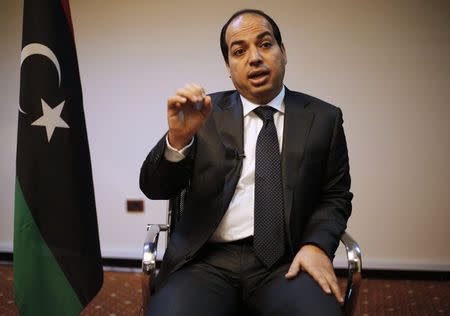Libya in standoff as acting premier refuses to yield power

TRIPOLI (Reuters) - Libya's acting prime minister, Abdullah Al-Thinni, on Wednesday refused to hand power to newly elected premier Ahmed Maiteeq because of questions over his appointment, and demanded lawmakers resolve the political dispute. The North African state, struggling with growing unrest, now has two prime ministers and a parliament deeply split among Islamist, anti-Islamist and regional factions that will complicate any swift resolution. Thinni said he had received conflicting orders from Libya's divided parliament over the legitimacy of Maiteeq's election and would continue in his caretaker post until the situation was clarified by the General National Congress or GNC. "The conflict is mainly taking place under the roof of the congress," Thinni told a news conference. "I call on congress members to wisely discuss their dispute, step away from their interests, and to give priority to the interests of the country to avoid bloodshed." Thinni referred to a decision by a justice ministry legal department that ruled Maiteeq's election early this month was illegal. Thinni said he had been told to hand over power by the parliament's president, but was ordered to stay in office by the congress first deputy. Libya, an OPEC oil producer and energy supplier to Europe, is deep in turmoil three years after the war that ousted Muammar Gaddafi, with Islamist, anti-Islamist, regional and political factions locked in a struggle for influence. Maiteeq, a businessman backed by independents and Islamist lawmakers, was appointed by GNC members after a chaotic vote contested by rival factions as illegitimate. Shortly after his appointment, armed gunmen claiming loyalty to a renegade former army general attacked parliament to demand lawmakers hand over power to a commission of judges until elections later this year. The former general, Khalifa Haftar, has launched a campaign with irregular forces, militias and some army units to purge Islamist militants from the country. Rival militias have accused him of attempting a coup. Gaddafi's authoritarian rule and three years of unrest have left Libya with few institutions and no real national army to impose state authority on the competing militias and brigades of former rebels who have become power-brokers. (Reporting by Ahmed Elumami; Writing Patrick Markey; Editing by Andrew Roche)

